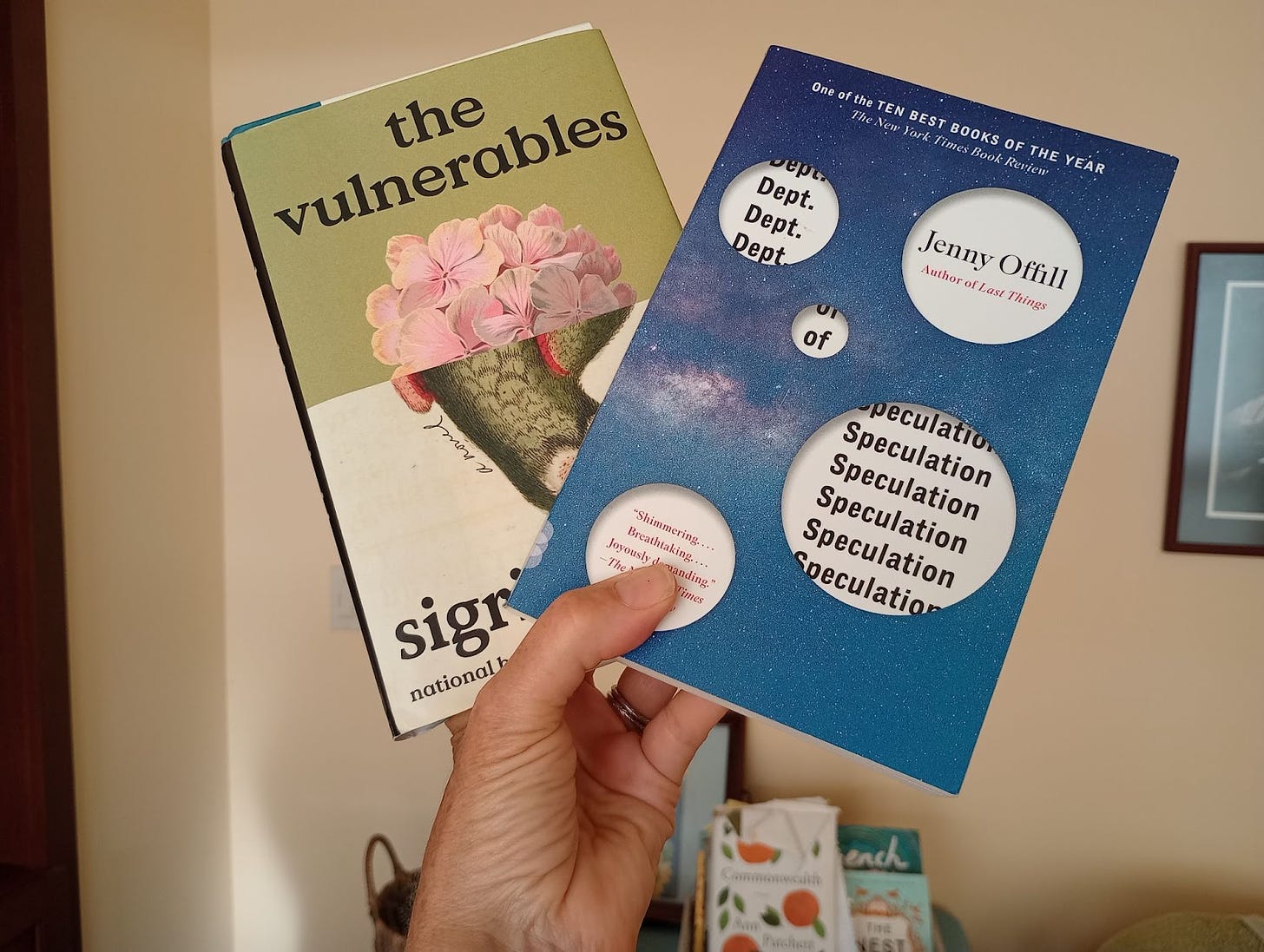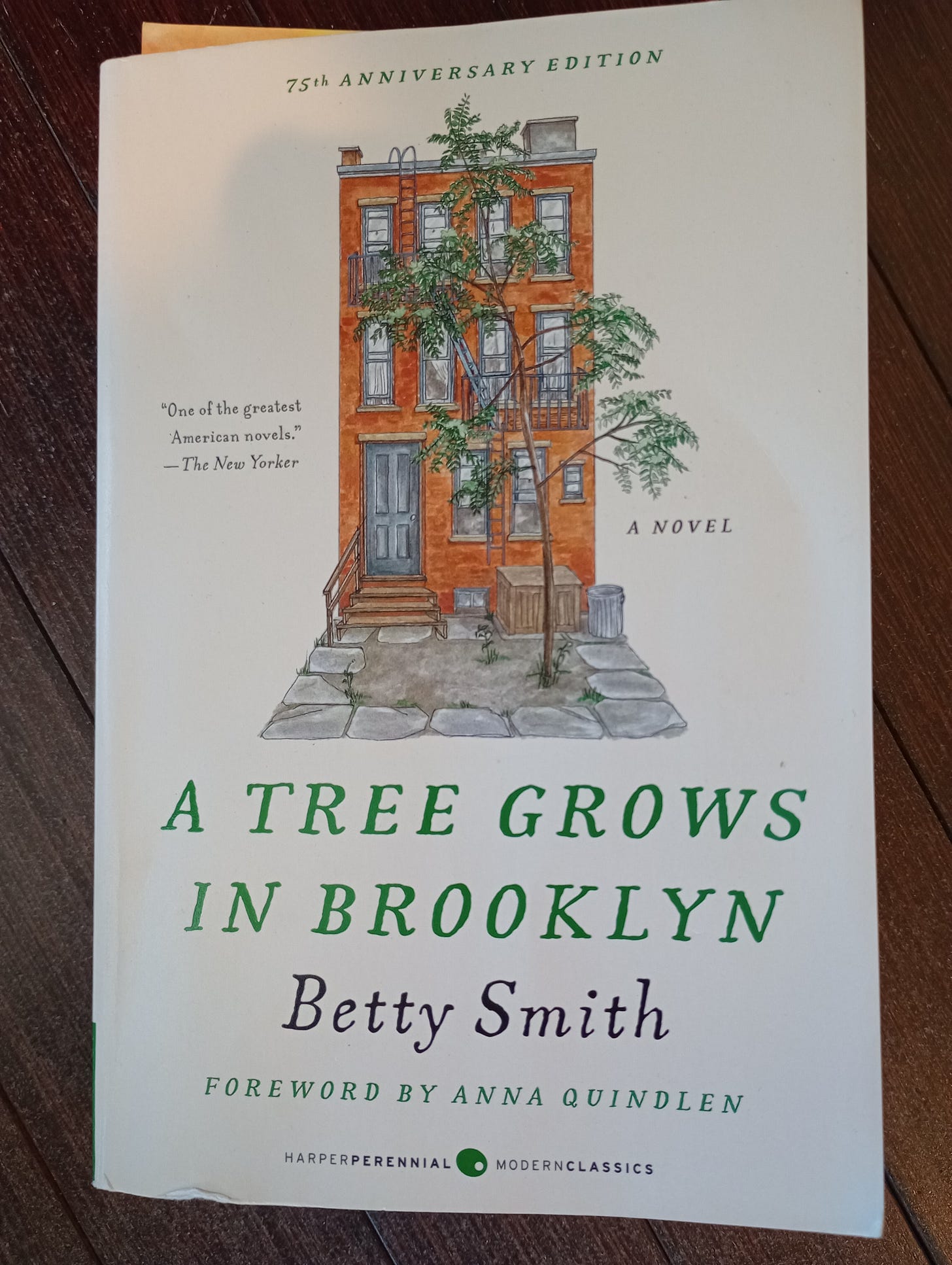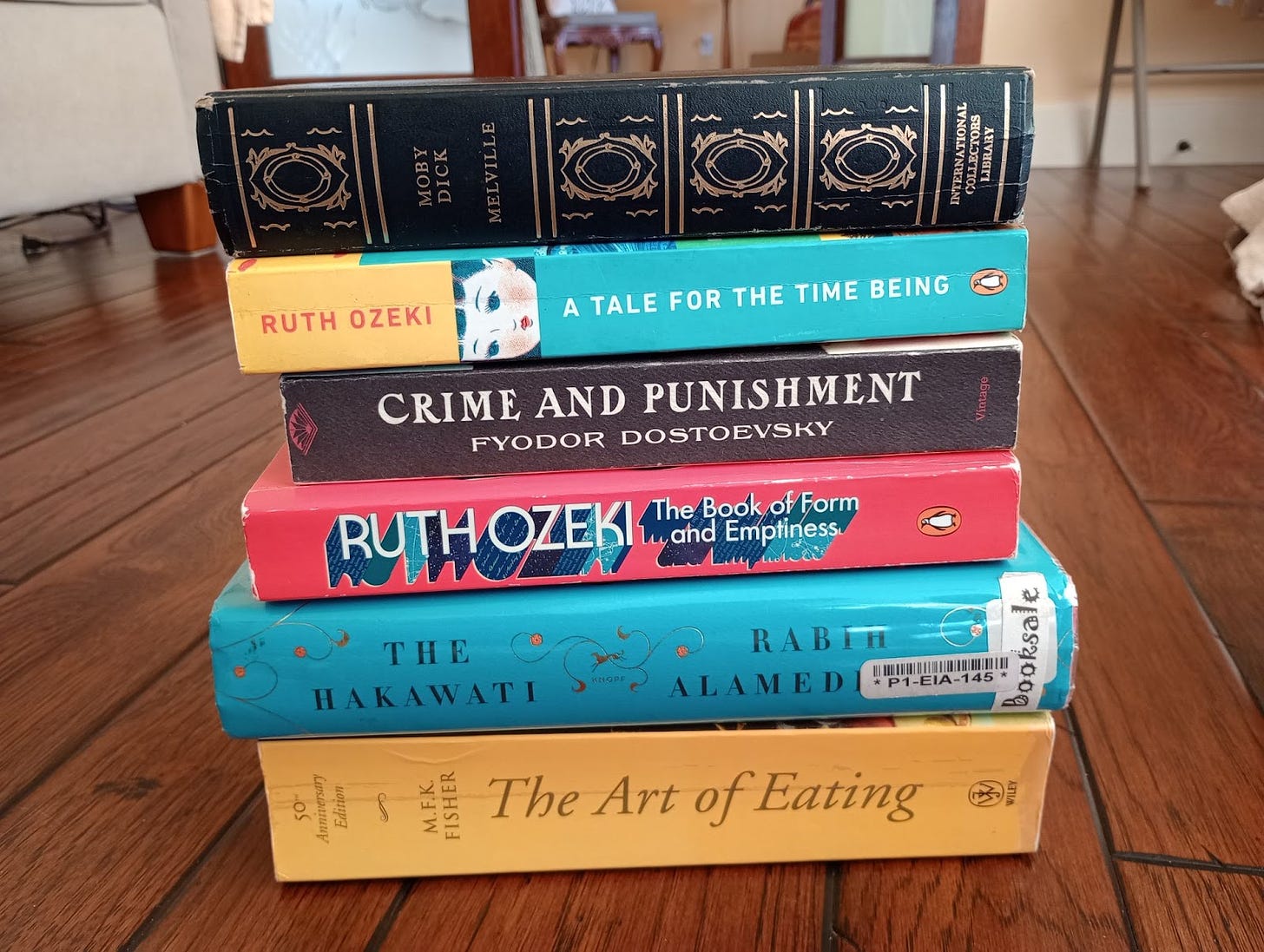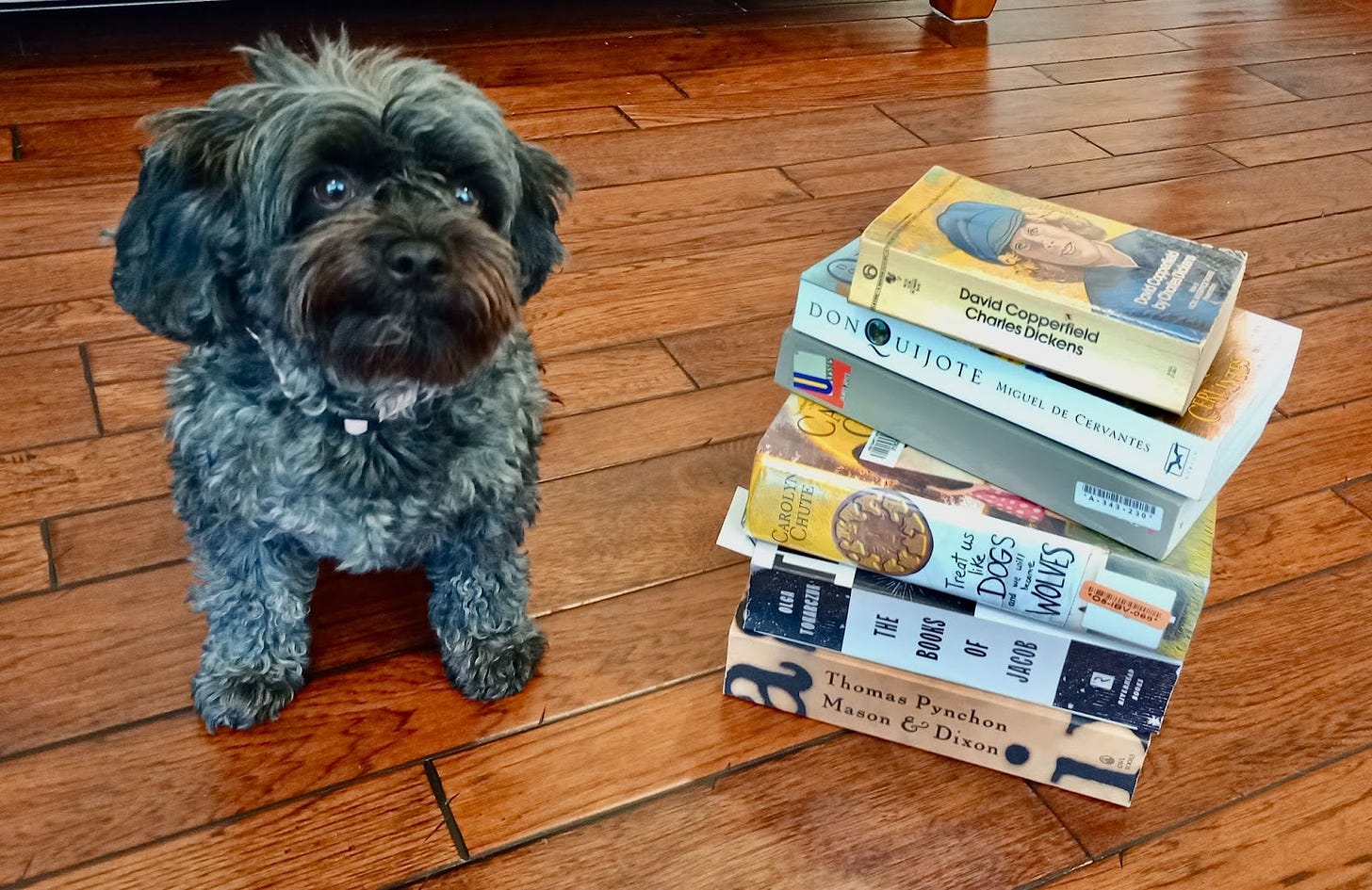Before we begin…
When it comes to books, does size matter? What’s your first thought when you encounter a book that, if it were to fall on you, might crush you under its weight? What’s the biggest book or smallest book you ever read and how did you feel about it?
Welcome! You’ve reached Spark. Learn more here or just read on. If you received this from a friend, please join us by subscribing. If you see something you like, please hit that heart so others can find us more easily. And if this email is truncated in your inbox, just click the headline above to come on through and read everything all at once.
Hi there,
Thank you very much for your encouragement and kind words after my last newsletter announcing the summer schedule for Spark, set up so that I can make headway on my novel-in-progress. I’m happy to report that it’s working. I’ve been writing daily and feeling happy with where things seem to be going. I’ll keep you posted. Meanwhile, I’ve got a question for you:
How big is too big?
One night, eons ago, my mate and I were reading in bed before turning out the light. From his side of the bed came the sound of a few pages flipping, then a sigh and a kind of thump. I looked over and his book was splayed open on his stomach and he was shaking his head.
“This book is way too heavy for me,” he announced.
“Well,” I said, “it is serious, but it’s also funny and it moves pretty well.”
“No, I mean it is just too big and heavy. I can’t hold it up to read it in bed.”
Neither of us remembers what he’d been reading but I do remember the loud whomp it made when he let it slide off the bed onto the floor. It soon disappeared from the book stacks by our bed. We still laugh about it but “too heavy for me” has become code between us when a book’s size asks more of us than we can give.
These days e-readers or audiobooks render novels of a thousand pages or more relatively easy to handle in bed. Neither one, however, addresses the question lurking in the pages of a big-ass book: will it be worth the commitment required to read it?
I’m embarrassed to even bring up a book’s heft, really. It’s a little like bringing up an actor’s weight or appearance instead of just experiencing their performance. I feel shallow. On the other hand, I find myself attracted more and more to writers who can convey the entirety of a story complete with all the facets of its characters and necessary background in two hundred pages or less. Short story writers have my undying respect.
“To borrow from a certain critic, in almost every long book I read I see a short one shirking its job.” - Sigrid Nunez, The Vulnerables
This question of length has lately inserted itself more and more not only into my reading but into my writing. Maybe it’s that my attention span is under assault or that I am not the connoisseur of fine literary work that I thought I was. It might have something to do with my ever-sharpening sense that my time on earth is limited and I’ll never get to read all the books on my shelves or write all the books I would like to write. In fact, my efforts to write a book cut deeply into how many and how deeply I can read the work of others. And if I feel that way, I have to think about my readers and their valuable time.
Several recent reads have re-awakened the question of book length for me. I’ve recently finished Sigrid Nunez’ novel, The Vulnerables and Jenny Offill’s Department of Speculation. The Vulnerables, like every Nunez novel I’ve read so far, runs a tight 250 pages and not a single word is wasted. Offill’s novel, like her later novel Weather, is a collage of brief paragraphs or even single stand-alone sentences that tell a story so complete you are not left wanting a single thing more.
I’m currently reading another New York novel now, the classic A Tree Grows in Brooklyn by Betty Smith. It’s a book I’ve always wanted to read but the going is slow. I am nearly three quarters of the way through it. Each page paints a vivid picture of a place and a time over the years it takes for the protagonist, Francie Nolan, to come of age. No detail is left out and my grasp of what it was like to be poor in Brooklyn just after the turn of the century is growing stronger with every page. The novel gives much but it asks much too. Some chapters appear to be inserted for the sole purpose of illustrating the politics of the day or the shift from horse-drawn carriages to motor cars. I find myself impatient. That saddens me. Am I surrounded by so much noise and distraction – in my own head and out of it – that I can’t sit still and let the images Smith crafted so beautifully enter my consciousness and savor them?
Of course so much depends on the book, the writing, the mood I’m in when I pick up a novel. Still the “heft” of a book, or page count, is increasingly on my mind. I never hesitate to pick up a book of 500 pages or fewer. When we get into the 600-900 page category — A Little Life by Hanya Yanagihara (832 pages), The Goldfinch by Donna Tartt (771 pages)– the stakes go up as do my expectations. I finished A Little Life filled with a confusing fusion of admiration (for the prose, the focus on friendships over time, the way the book pushed me to examine my capacity for empathy) and resentment. The characters and their stories were told over and over again without detectable advancement. I’ve started The Goldfinch three times and have closed it before finishing the first few chapters. I feel certain that there is gold within. I want to love it the way so many have loved it. It asks more of me, though, than I want to give. At least for now.
On the other hand, I could not put down Moby Dick (502 pages) or Crime and Punishment (551 pages). Go figure.
When I was reading Gone With the Wind for the first time as a young girl, I was sorry when the story ended on page 1,036. I spent years imagining how the story of Scarlett O’Hara would play out after the book’s final sentence, then years more grappling with the way Mitchell essentially eulogizes a time, place, mindset, and culture that depended on slavery and set the stage for injustice and division that continues to prevail.
In the end, a book’s length probably isn’t the critical factor when it comes to choosing what to read next but it may play a role in whether or not I decide to finish it. What about you? Do you agree with Jeannette Winterston that it is “rude to write long books?”
“The question of length is a real one, it’s not arbitrary. Life’s too short. I think it’s rude to write long books. I prefer to make a talisman for people to carry in their hands rather than create a huge suitcase that they have to drag around with them and open now and again to get at the contents.” - Jeannette Winterston in her interview with Bomb
If you like what you see or it resonates with you, please take a minute to click the heart ❤️ below - it helps more folks to find us
Ann Patchett: the hard books, the easy books
Couldn't handle James Joyce's Ulysses or David Foster Wallace's Infinite Jest? This quickie from Ann Patchett offers some alternatives.
Long books I’ve read and loved
Long novels I look forward to reading someday
In other news…DimeStories
For years now, good friends in the San Diego writing community have urged me to read at DimeStories - an open mic night for prose readers. The catch: I would only have three minutes before the hook would come out and I’d be hauled off the stage (or at least that’s how I imagined it). This week, I did it. I showed up at The Book Catapult bookstore in San Diego and told a story prompted by an incident that happened in fifth grade. It was a small story, and a simple one but it held up and it was a start. And I wrapped it up with seconds to spare.
This showed me I could: 1) leave the house on a weekday night and enjoy myself thoroughly and 2) write a story with a beginning, middle, and end in about 500 words. (Perhaps I should try this exercise for more editions of this newsletter?!)
I’m looking forward to trying it again. Here you can listen to four recent readers from DimeStories San Diego which includes two members of the Spark community: Judy Reeves and Jay Vu. You’ll smile, you’ll cry, you’ll be able to listen while you sip your coffee or whatever you’re drinking. And it will be over way too soon.
Listen to some DimeStories by clicking this link
More news from around the Spark universe
Looking for your next crime read or just love LA-based noir? I am now. As I was reading through my Substacks over lunch today I found out that Spark subscriber
of , author of “slacker crime” novel Not Safe For Work (think Big Lebowski goes bowling in Porn Valley) has launched a new project called Doing Crimes. Here he writes about crime genre on the page and on the screen. His first post is about Gary Phillips’ Violent Spring introducing Ivan Monk, an LA private investigator charged with finding out who murdered a Korean shop owner during the volatile period surrounding the Rodney King riots. I loved how Michael wove in historical background and some fun facts about the author and the path this book took to being published.- is writing the LA Times book club newsletter this summer. Check out his take on the best short story collections here and everything you wanted to know about StokerCon, the convention for horror writers here.
If you’ve got something going on that you’d like to share, let us know! Just reply to this newsletter with your news and I’ll get it in the next time. Or even better, put it in the comments below. I’ll still highlight it but then folks won’t have to wait.
Welcome New Subscribers!
If you’ve just subscribed, thank you so much for being here. If you would like to check out past issues, here’s a quick link to the archives. Be sure to check out our Resources for Readers and Writers too where you will find links for readers, book clubs, writers, and writing groups. And if you’d like to browse for your next read, don’t forget to check out books by authors in our community at the Spark Author Page which will be updated with new names and books for next week’s issue. Another great source: the many wonderful reviews you’ll find among the #Bookstackers.
The more the merrier! Please share with your friends and invite them to join us!
Ways to show you like what’s happening here
We don’t do paywalls here but we do work hard so if you’d like to show your support for Spark, here are some ways to do that:
And if you’d like to put your money to good work…
Consider a paid subscription ($5/month or $35/year) or use this as a link that will allow single contributions of any amount via PayPal.
There will be no paywalls. All subscribers will still have access to every post, archives, comments section, etc. If finances are an issue (and when are they not?), you can still show your support for Spark by participating in our conversations, “liking” a post by hitting that heart, and by sharing Spark among your friends. All of these things help bring new subscribers into the fold and every time we expand our audience, the conversation grows and deepens. Click below for more info.
Let me know how you are and what you’re reading. If there’s an idea, book, or question you’d like to see in an upcoming issue of Spark, let us know! Use the comment button below or just hit reply to this email and send your message directly.
And remember, If you like what you see or it resonates with you, please take a minute to click the heart ❤️ below - it helps more folks to find us!
Ciao for now!
Gratefully yours,
Betsy
P.S. And now, your moment of Zen…a poll
You’ve got a book in your hands, where do you go to read it? If your choice isn’t covered, tell us about your favorite reading spot.
Calling for Your Contribution to “Moment of Zen”:
What is YOUR moment of Zen? Send me your photos, a video, a drawing, a song, a poem, or anything with a visual that moved you, thrilled you, calmed you. Or just cracked you up. This feature is wide open for your own personal interpretation.
Come on, go through your photos, your memories or just keep your eyes and ears to the ground and then share. Send your photos/links, etc. to me by replying to this email or simply by sending to: elizabethmarro@substack.com. The main guidelines are probably already obvious: don’t hurt anyone -- don’t send anything that violates the privacy of someone you love or even someone you hate, don’t send anything divisive, or aimed at disparaging others. Our Zen moments are to help us connect, to bond, to learn, to wonder, to share -- to escape the world for a little bit and return refreshed.
I can’t wait to see what you send!
And remember, if you like what you see or it resonates with you, please share Spark with a friend and take a minute to click the heart ❤️ below - it helps more folks to find us!









I’m currently halfway through WAR AND PEACE, with the cheerful guidance of Simon Haisell, whose Substack readalong has made this huge project possible. The longest book of my life is rewarding its length, drawing me into an entire world of turmoil, catastrophe, loyalty and love that is remarkably like our own. I listen toThandiwe Newton’s beautifully voiced audiobook while reading my ebook, which helps to keep me focused.
Tolstoy aside, I’m with you. I consider length before starting a book and rule out most of those over 350 pages. I’m grateful to writers like Sigrid Nunez and Patti Smith who deliver an entire experience in a chiseled book. Alice Munro could distill a life into a short story. I have relished a few long novels of my own time (A FINE BALANCE is among my books of a lifetime). But most writers of long books are trying my patience.
If I purchase a book that has hefty pages, I pull it apart in segments that are easily held; I do not enjoy weight-lifting when reading a book. Furthermore, since I get most of my books from a library I am forced to finish because of the time constraints on newly released books that must be returned by a certain date. And, although there are many exceptions, lengthy book writers have a tendency to give the reader TOO MUCH information that could easily be cut.